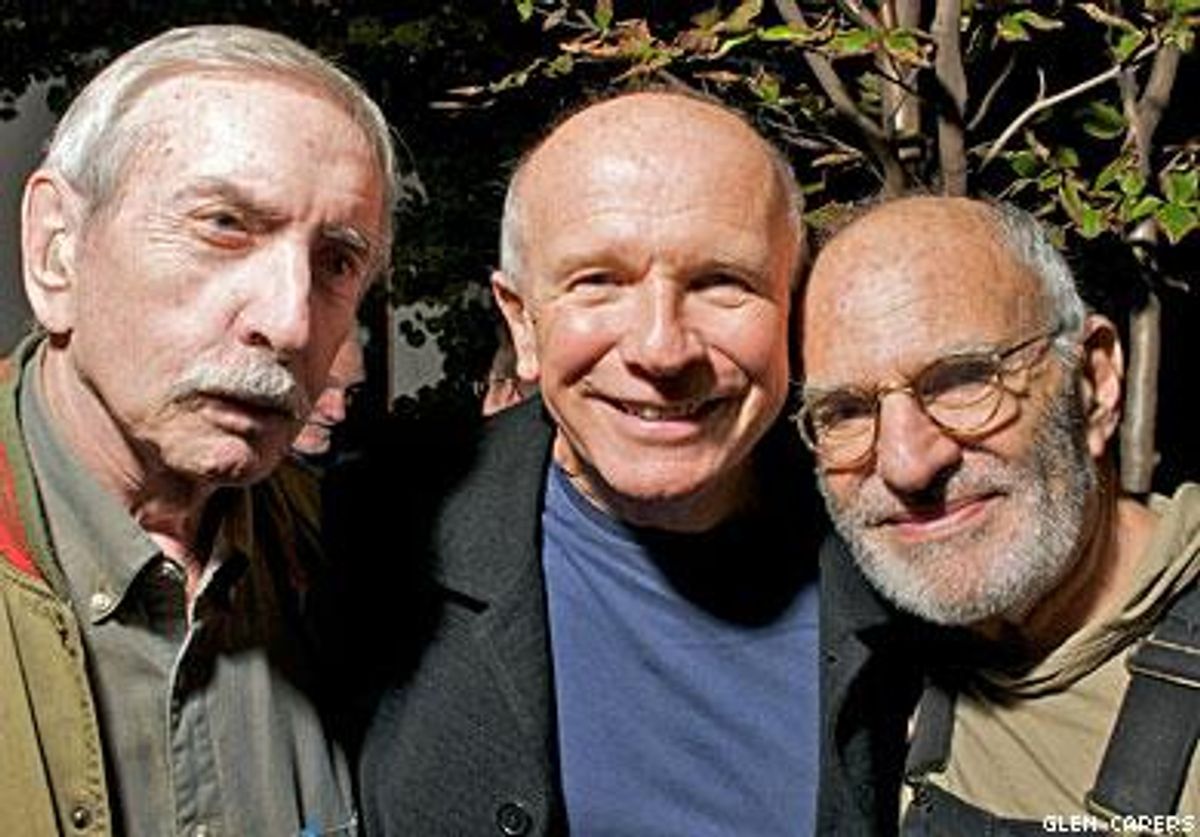Opening night of
Terrence McNally's Corpus Christi at the
Rattlestick Theater in New York was a benefit for the
Matthew Shepard Foundation and a perfect reflection of how
prophetic the 1998 play really was. The show portrays
Jesus (or, as he is sometimes called, Joshua) as a
young persecuted gay man who's eventually executed
-- strung up -- much as Shepard was 10 years ago in Wyoming
(he died the day before the play's world premiere).
But before that climactic scene, Jesus presides over a
gay marriage of two of his disciples. And when asked
about Leviticus's oft-quoted statement that two men
lying together is an abomination, he simply asks,
"Why would you choose to memorize such a nasty
passage?" While gay marriage and reclamation of
religion were the stuff of fantasy back then --
Corpus Christi is all the more poignant
today because we've seen so much of it come to
pass.
The play
dramatizes classic biblical stories, but McNally
incorporates fresh twists to them with references to
television, the paparazzi, and football. The main
character, Joshua, is a sexually confused young man
from Corpus Christi, Texas, who gets picked on a lot and
molested by priests. He tries to date girls until he
meets Judas, who helps him defeat the bullies and
becomes his high school love. Years later, the two
meet again as Joshua is accumulating his disciples, all gay
men. Their love story threads the play together and
makes the inevitable ending all the more difficult.
(Mary Magdalene is not in this production, but there
is still a prostitute character.) McNally turned one of the
oldest stories ever told into a tale of tragic
romance.
Corpus Christi first premiered amid a great
deal of controversy. The religious right was in an uproar. A
fatwa was declared on the play. The show seems tame by
today's standards -- there is, however, a scene
in which Judas and Joshua make love (fully clothed)
and others in which a male prostitute bares his penis
(obscured) and moons the audience. But the idea that
Jesus could be a gay man and that being gay enabled
his understanding of tolerance and love blew more than
a few minds in its time.
The theater
troupe 108 Productions has been performing Corpus
Christi, directed by Nic Arnzen, around the world
for more than two years. But the group arrived in New York
for the first time Sunday, the night before the show
opened at Rattlestick. With no patron and no stage,
the troupe meets sporadically in Los Angeles
"at whomever is willing to have the group over to
their house," says Steve Callahan, who plays
Judas. The troupe includes women, so many of the
characters didn't register as gay men as they did in
McNally's original version. But the performance
was full of life, helped in no small part by the
audience, which included McNally, Edward Albee, and
Larry Kramer among others.
The show opens
with the group milling on stage, hugging each other, and
talking as if they're at the start of an AA meeting.
They eventually change, onstage, from their street
clothes to a uniform of khaki pants and white shirts.
And while the this Godspell-like beginning
(people putting on a play about Jesus Christ) seems staged
and the camaraderie forced, once you realize the
troupe has been together for so long, the interaction
seems genuine. Everyone ends up playing multiple parts
(except James Brandon, who plays Joshua), weaving seamlessly
into and out of character with the help of minor
costume and lighting changes and fantastic
choreography that reconfigures the group from cars on a
highway to a field of serpents in the blink of an eye. The
stage is bare except for a couple of benches and a few
props, and the actors keep the audience engaged with
nothing more than their talent.
The performances
are remarkable, however. Molly O'Leary, who plays
Thomas, really chews the scenery -- there's even a
line in the play warning us that she will do just
that. She owns all the comedic moments in the play.
But the real standout is Brandon as Joshua. His embodies the
original message of Jesus with so much charisma that you
believe it actually may be possible to love your
fellow man no matter what. His torment is palpable,
and when he is crucified and the actors (now out of
character) take him down, Brandon is a mess. Switching out
of his character and back into the real world, he can
barely keep it together as the cast members help him
into his jeans. This is perhaps the revival's
greatest success. How hard it must be to get an audience to
become emotionally involved with a story
they've seen performed in innumerable ways. But
watching this cast go from being as excited as a kid on
Christmas about playing these parts to being inconsolable is
undeniably moving.


















































































